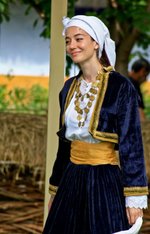Theseus
¥
Another beautiful song I've come across, sung by the incomparable Σοφία Βέμπο:-
Στην αμμουδιά την μαγεμένη
μιά ψαροπούλα αγκαλιασμένη
με τον καλό της τον ψαρά
μεθάει από χαρά
Κι οι δυό τους έχουνε μεθύσει
και μέσ' την πορφυρένια δύση
σφίγγεται επάνω του εκείνη σαν παιδί
κι εκείνος την φιλά και σιγοτραγουδεί
Αχ ψαροπούλα
μέσ' τις θάλασσες και στ' ακρογιάλια
δε θα βρεθούνε
σαν τα χείλη σου τέτοια κοράλλια
Πάνω στα μαλλιά σου
παιχνιδίζουν τρελλά μαϊστράλια
και σου γελά
το κύμα όταν κυλά
Μα μιά βραδυά φουρτουνιασμένη
άδικα εκείνη περιμένει
αφήκε εκείνος την στεριά
και πάει μακριά
Έφυγε με το πυροφάνι
ποτέ πιά πίσω δεν εφάνη
κι ενώ κυτάζει με μιά ελπίδα της κρυφή
το μαϊστράλι φέρνει ετούτη τη στροφή
Αχ ψαροπούλα μες στις θάλασσες και στ’ ακρογιάλια κτλ.
I understand nearly all of this: presumably the word in blue bold means not a fishing boat but a fish maid(!!) and the words in red means 'she clings to him'.
Στην αμμουδιά την μαγεμένη
μιά ψαροπούλα αγκαλιασμένη
με τον καλό της τον ψαρά
μεθάει από χαρά
Κι οι δυό τους έχουνε μεθύσει
και μέσ' την πορφυρένια δύση
σφίγγεται επάνω του εκείνη σαν παιδί
κι εκείνος την φιλά και σιγοτραγουδεί
Αχ ψαροπούλα
μέσ' τις θάλασσες και στ' ακρογιάλια
δε θα βρεθούνε
σαν τα χείλη σου τέτοια κοράλλια
Πάνω στα μαλλιά σου
παιχνιδίζουν τρελλά μαϊστράλια
και σου γελά
το κύμα όταν κυλά
Μα μιά βραδυά φουρτουνιασμένη
άδικα εκείνη περιμένει
αφήκε εκείνος την στεριά
και πάει μακριά
Έφυγε με το πυροφάνι
ποτέ πιά πίσω δεν εφάνη
κι ενώ κυτάζει με μιά ελπίδα της κρυφή
το μαϊστράλι φέρνει ετούτη τη στροφή
Αχ ψαροπούλα μες στις θάλασσες και στ’ ακρογιάλια κτλ.
I understand nearly all of this: presumably the word in blue bold means not a fishing boat but a fish maid(!!) and the words in red means 'she clings to him'.


